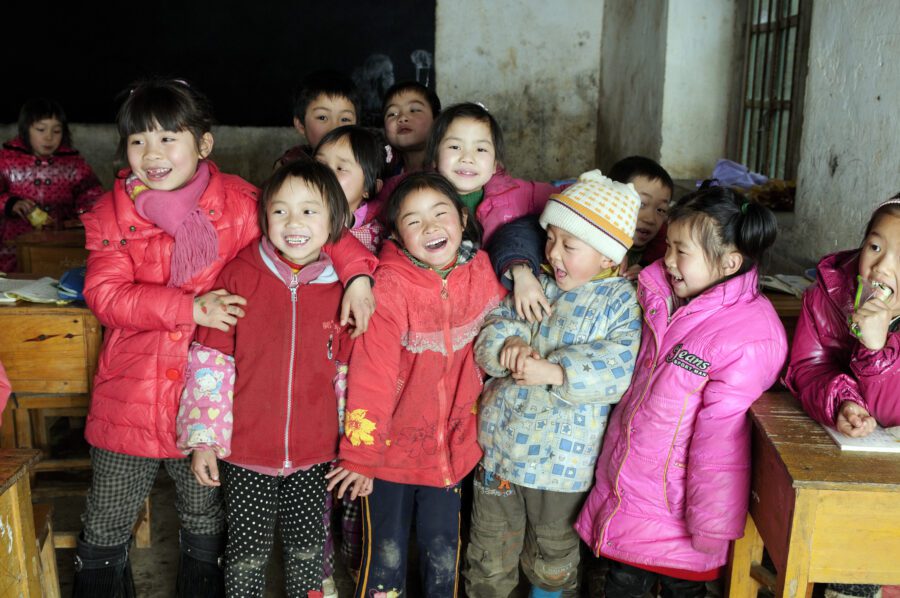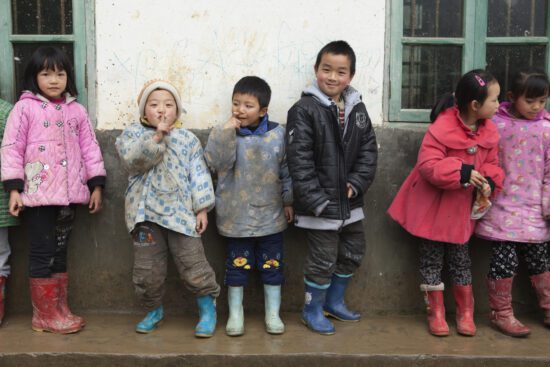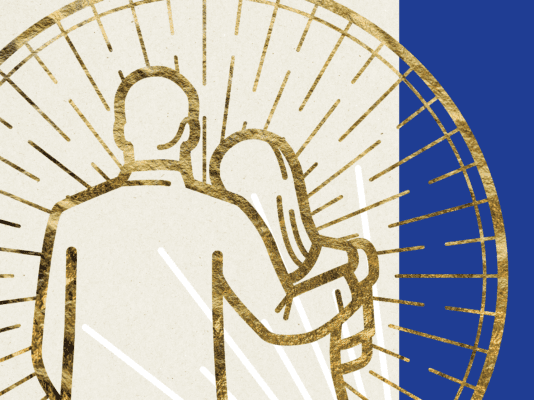In the fall of 2024, China announced it was ending most foreign adoptions, leaving hundreds of families and children, mostly with special needs, in limbo. Trent and Ginny Henderson and their family have been acquainted with adoptions in China for a long time and are intimately familiar with those affected by this move. Trent is the pastor of Heritage Park Baptist Church in Houston, Texas. Ginny is a physical therapist at Texas Children’s Hospital and has traveled to China multiple times to evaluate orphans with special needs to bring clarity to their paperwork for adoption. The Hendersons have four kids, two biological sons and two lovely daughters adopted from China. Below, they discuss what’s going on in China, their own call to adoption, and how their family has worked through this disappointing experience. As we remember Orphan Care Awareness Month, let’s step in through prayer and action to see God move in ways only he can.
Lindsay Nicolet: What is going on in China in the news regarding foreign adoption?
Ginny Henderson: In 2020 when COVID hit, China stopped their adoption process, much like they did during SARS. We fully expected it to pick right back up when things settled down, but it didn’t. And then [we} thought surely when they opened up for the Olympics that they would allow adoptive families to come, but they didn’t. Finally, they decided they were closing the program when there were about 300 families who had referral approvals like we did [and] who were weeks, if not days, away from traveling to pick up their children.
In the adoption process, you have a pre-approval which says “you’ve been matched, but we need to process your dossier.” Then you have a referral approval which says “this child is yours. You are fully committed, and we are fully committed to you.” Then you work out things on the United States. side for travel. That’s when you get a travel approval, and then you go within days. So they let the families that had travel approval, those who already had airline tickets, go ahead and complete their adoptions, but they did not allow the families who had referral approvals.
These are families who have been communicating with these children and paying thousands of dollars every year to renew their home studies, to renew their adoption fees, to renew their immigration status. And [China] just came back and said, “We’re closing the program.” Their reasoning for closing the program is they have a reverse population problem where they don’t have enough children, and so they’re saying that there’s no longer a need to place children. However, these are children that were committed to families with the legal paperwork and approval to be U.S. citizens. . . . It’s 300 kids. It’s not going to change the population of China.
LN: What led you to foreign adoption in China, specifically to adopting children with special needs?
GH: When I was a junior in high school, I watched a Dateline or Nightline on the orphan crisis in Eastern Europe. It showed that in Romania they would look at children who were orphans, and if they so much as had a lazy eye, they would put them in an institution where they would sit on the floor, be neglected, and splash around in their own urine until the day they died. That really struck me, and in that moment I felt like God really spoke to me. It was like, “You are going to be a part of that. I am calling you now.” I wanted to live my life to advocate for orphans that other people are not advocating for.
When Trent and I started dating at Baylor, I was very clear that “if you marry me, it’s going to come with adoptive children.” I went into healthcare because I knew that I wanted to travel overseas, and physical therapy was a good match for that. China was the country that people were adopting from more due to the crisis with the “one child” policy. So that’s why we chose China. As a physical therapist, I wanted to adopt children who otherwise might not be adopted and use the skills that God has given me to make a difference in a place where other people don’t have that capacity.
LN: What would you say to Christians who are considering foreign adoption yet are scared by the realities of its demands?
Trent Henderson: First of all, for any follower of Jesus, adoption is how we got into God’s family. Secondly, in light of how God has loved us and pursued us, the gospel requires us to think about those around us who cannot speak for themselves and are the most vulnerable, the widow and the orphan. I think that’s part of our calling as followers of Jesus.
As a bit of a personal testimony, I wasn’t used to having women in my house, except for my mom and my wife, up until the point where our daughter came along. I knew that I was committed to Ginny and that I was committed to the process, but I did ask the faith question of “God, can I love a daughter? Can I love one who is not biologically my own?” We got a picture of our oldest daughter. There was a divine heart surgery there that God just did. So let me just say, of course you can love someone who is different from you. That has, hands down, been answered for me.
If one spouse feels a little more strongly than another, I would just advocate that you keep talking about it. Don’t hesitate to take steps, because it was in the step taking that my heart grew more and more for this. The last thing I would say regarding finances and hurdles—there are certainly hurdles. I don’t want to downplay those at all. There are physical limitations that come with adopting special needs kids. There are emotional limitations for any kid who has experienced trauma and abuse. There are financial hurdles to overcome as a family. But let me tell you, we have never seen God overcome hurdles like we have in the cause of adoption.
GH: We have story after story where God has given us exactly what we needed, exactly when we needed it. When we were pursuing Piper, the child that we weren’t able to complete [adoption of] because of this process, there was a $5,000 deposit to get going. We checked our mail and a friend of ours from San Antonio who we had not talked to in years had sent us a $5,000 check. He said, “My wife and I were praying for you guys, and we felt like the Lord was telling us to do this.” We called him and said, “We haven’t told a soul yet, but we just said yes to stepping back into this process, and this is our initial payment.”
With this final adoption we were like, “Can we do five children?” We thought we were done. And Trent said, “I don’t think we’re ever going to stand before God and repent for advocating for the orphan. Is it going to be hard? Yes. But I don’t think it’s something where God would ever say ‘Shame on you for opening your home and bringing another orphan into your home.’” That’s not meant to make anybody feel guilty but to say that you look and see where God is moving and you step into that. He has made it very clear that he moves in the cause of orphans and widows, and when we step out in faith in response to that, it’s amazing to see how he moves.
As far as raising special needs kids: my kids, I mean, they’re not easy. There are things that are inconvenient. For example, we spent several months in the hospital with our daughter, but I certainly wouldn’t trade it to have those months back doing whatever else I would’ve been doing during that time. They’re worth it. They have value. Their special needs don’t change that.
TH: I would just add that every kid in their own unique way is a special needs kid. That’s not to downplay some of the physical challenges or emotional challenges that others face, but each kid is unique. God knit them together uniquely. And because of that, they all have their own bent, their own needs. There is no perfect childhood, perfect kid, or perfect parent.
If you see something in the world that breaks your heart, a small group of people can make a difference in that place. . . . and it’s amazing what the Lord can do through a small group of people who are moved by what they see and who are willing to take that step of faith.
LN: How is this China foreign adoption policy affecting your family?
GH: Our story [is] one to really shake your faith and make you ask, “God, what were you doing? If you are omniscient, then why is this happening?” When I was [in China] in 2019 evaluating kids, I took my high school age son with me because he had been in Chinese classes and was speaking Mandarin, and I wanted to expose him to the other side of the world where his sisters came from. He bonded with this one little 5-year-old girl. We gave all the children American names while we were there and evaluating them since it makes it easier to advocate for them, and the name we gave her was Piper. And when we got back to the hotel room on night two, my son said, “Mom, we need to adopt Piper.” So we stepped in with Piper. She had a small tumor that was in front of her lumbar spine, and that was her big special need. We were prepared to get her and bring her home and take her to MD Anderson here in Houston and get her the care that she needed.
And then as everything went on hold. We would get annual updated MRIs from her orphanage. At some point, about two years in, all the orphanages stopped communicating with families. And so we got one last MRI which showed that the tumor had grown to where it had wrapped around her aorta. We waited and then we asked for an update a year later, and they refused to give it to us or tell us how she was doing. We took that image to a friend of ours who was a surgeon at MD Anderson and asked him what he thought. And he said, even just based off of this image, “We can’t save her. There’s no way to go in.” He said she might not even survive the flight because at any moment her aorta was going to rupture. We sent that to the agency in China and asked for updates, but they wouldn’t respond to us.
They were not talking to anybody. So through a counselor and through talking to MD Anderson, we had to decide that the most humane thing that we could do for Piper, if she were even still alive, was to allow her to pass within the environment that was familiar to her with the people who had been family to her. That was a really hard decision to make because we had felt that God called us to this, and we still believe that because we saw the signs, and yet here we are.
Even since then, none of the agents or the orphanages had talked to any of the adoptive families. So these families have not had any contact with these children in several years. China just shut it all down even though the process was still on hold and they were still pursuing it. [These families] don’t know anything about the health of the child that they committed to in 2019 and 2020.
I think the families who are still in the process are hoping to appeal to that sense of duty and honor that China has. A lot of families have had to back out because the other problem that you run into with international adoption is that most social workers and most agencies will not let you pursue a concurrent adoption while you’re matched with a child from another country. A lot of these families have fertility issues. This was going to be how they built their family, and they put all that on hold for another four or five years, waiting on this child that they were matched with. And they had to come back and say, “If we’re going to build our family, we can’t count on China to do what China said they were in to do at this point.”
LN: How can Christians make a difference in situations like these?
GH: One of the things that I have seen over the decades with Chinese adoptions that I am so amazed at is the power of the nonprofit started by a few concerned people to change a culture. When Americans found out about the “one child” policy, then we started adopting from China, and we ascribed value to these children.
And then you had organizations like One Sky that were mostly created by moms and families who had adopted from China, who had gone in to pick up their children, saw what was happening, and said, “My commitment here is not done yet.” So they created nonprofits where they put nannies back into the Chinese system to help the Chinese take care of these orphans.
And then we brought foster care over to China, and a lot of these organizations created foster homes. And you saw that with Stephen Curtis Chapman’s organization. And so essentially these small nonprofits that were Christian-based looked and saw an issue, stepped out and did something, and changed the way the entire Chinese culture viewed their orphans.
What we saw initially is everybody was adopting newborns because there were all of these newborns being abandoned. Well, the newborns were no longer available because the Chinese were either no longer abandoning their newborns, and they were keeping their daughters instead of saying that they’re not valuable. And so you saw the Chinese doing things that culturally they had not done for centuries in describing value to females and in adopting.
As you watch the trend of it, the adoption movement went from healthy infants to special needs older kids. And it was a beautiful thing. It was frustrating to some adoptive families who were waiting, but the wait for a healthy infant went from six months to 10 years because they weren’t available anymore. And the reason they weren’t available is because we had ascribed value to them, and the Chinese culture changed to ascribe value to them also. Now you have all these special needs kids, but what we’re not seeing is we’re not seeing people come in and adopt the special needs kids. [China] still ha[s] a problem for the 10-year-old kid with a tumor, or a kid with Down syndrome or arthrogryposis or spina bifida. Those children are being raised in the orphanage without families and then just sent out to survive.
If you see something in the world that breaks your heart, a small group of people can make a difference in that place. And we saw that play out in China, and it’s amazing what the Lord can do through a small group of people who are moved by what they see and who are willing to take that step of faith.
*This article has been edited for length and clarity










